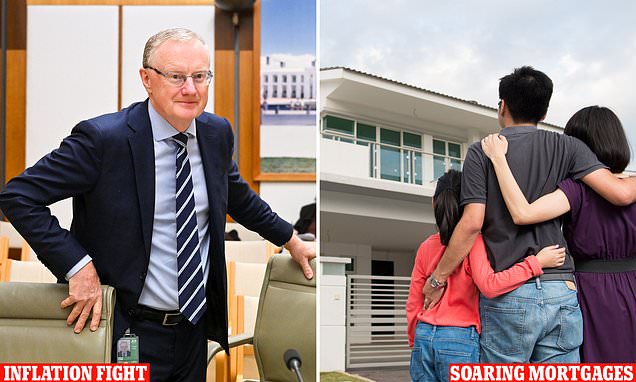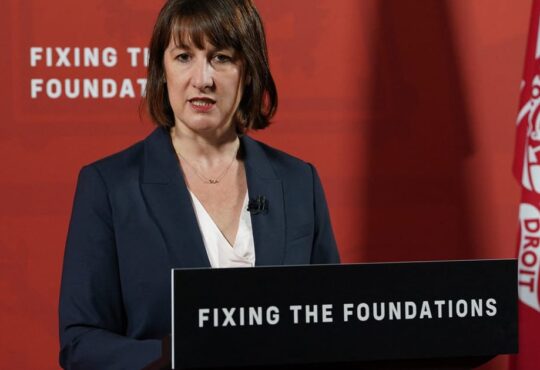Mortgage rate bombshell as ANZ Bank predicts more pain for homeowners after inflation shock

By Kevin Airs For Daily Mail Australia
02:30 02 Jun 2023, updated 03:06 02 Jun 2023
- Unexpected inflation rise triggers interest rate fears
- Bank analysts tip another 0.5 per cent on mortgages
ANZ Bank has predicted more interest rate pain ahead with a warning it expects rates to rise by another 0.5 per cent, adding almost $250 a month to mortgages.
Analysts have revised up their expectations of the peak cash rate to be imposed by the Reserve Bank of Australia, rising from 4.1 per cent to 4.35 per cent.
The current cash rate is 3.85 per cent, but the latest soaring inflation figure has triggered warnings the cash rate is set to rise again, probably by 0.25 per cent.
And the latest forecast by ANZ says it now expects a further 0.25 per cent rise to follow, with interest rates set to peak in August in the fight against rising costs.
‘We are moving our forecast of the RBA’s terminal cash rate to 4.35 per cent,’ said the bank on Friday.
‘We no longer see 4.1 per cent as sufficient to bring inflation back to the target in reasonable time. We see as August most likely for a move.’
Raising interest rates by 0.5 per cent would add an extra $229 a month to the current average NSW mortgage of $710,000.
Nationwide, the average $600,000 mortgage would rise by $195 a month, sending payments up to $3,789.
That’s $1,483 more a month – or $17,796 more a year – compared with early May 2022 when rates began to rise in the first increases since November 2010.
The warning comes after the headline inflation rate increased to 6.8 per cent in April in an unexpected rise, after falling to 6.3 per cent the month before.
Rising energy and fuel costs, year on year, played a large part in the shock inflation figure, but RBA governor Philip Lowe said the rental crisis was also playing a key role.
‘It’s a very significant issue because rents are the single largest component of the CPI,’ he told a Senate committee on Wednesday.
‘We’re expecting growth in rents as measured in the CPI around close to 10 per cent.
‘It’s very tough and some people are experiencing bigger increases in rents than that.’
Dr Lowe blamed the pandemic for fewer people living together in each Australian home but said rising rent and house prices was a deterrent to people living alone, forcing them to share.
‘The population is increasing by two per cent this year, are there two per cent more houses? No,’ he said.
‘The higher prices do lead people to economise on housing, don’t they?
‘Kids don’t move out of home because the rent is too expensive, or you decide to get a flatmate or a housemate,’ he said.
‘We need more people on average to live in each dwelling and prices do that.’
But he admitted: ‘It’s one of the biggest challenges we face as a country. It’s hard to change the design of our cities because there’s so many vested interests.’
The RBA will announce its latest statement on the cash rate next week but ANZ Bank experts admits it’s now tricky to make firm predictions on how the RBA will act.
But it says it expects a rise of 0.25 per cent in June or July in the continuing crackdown on inflation, followed by another identical rise in August.
‘On the timing, we acknowledge the challenge of calling the RBA from month to month,’ said a spokesman for the ANZ Research department.
‘We consider August the most likely month for a move from the RBA, driven by the quarterly forecast update cycle and uncomfortable timing around the return of inflation to the target.
‘Ahead of that we expect an increase in either June or July (calling the month is a line ball decision in our view).
‘Given our view that higher rates are more likely and the long tendency of the Bank not to delay, at the margin we favour a June rate hike.’
NAB economists believe the cash rate will peak at 4.1 per cent, while the Commonwealth Bank and Westpac are not expecting any further rate rises.
AMP chief economist Shane Oliver has previously warned a 4.1 per cent cash rate would cause a recession.
The cash rate has increased 11 times since May, 2022 as the nation struggles to cope with soaring cost of living rises.






